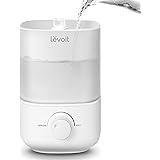LEVOIT Top Fill Humidifiers for Bedroom, 2.5L Tank for Large Room, Easy to Fill & Clean, 28dB Quiet Cool Mist Air Humidifier for Home Baby Nursery & Plants, Auto Shut-off and BPA-Free for Safety, 25H
$33.99 (as of December 3, 2025 14:48 GMT +00:00 - More infoProduct prices and availability are accurate as of the date/time indicated and are subject to change. Any price and availability information displayed on [relevant Amazon Site(s), as applicable] at the time of purchase will apply to the purchase of this product.)In the realm of electrical systems and equipment, ensuring the integrity of insulation is of paramount importance. The reliability and safety of electrical installations depend on the insulation’s ability to withstand the rigours of operation. That’s where IR test equipment comes into play. IR, short for insulation resistance, is a critical parameter that determines the effectiveness of insulation. This article delves into the world of IR test equipment such as the Megger Tester, exploring its significance, applications, and the indispensable role it plays in maintaining electrical system performance and safety.
Understanding Insulation Resistance: The Key to Electrical System Health
Insulation resistance refers to the ability of an electrical component or system to impede the flow of current through its insulation material. It acts as a barrier against unwanted leakage of current, preventing electrical faults, short circuits, and potential hazards. Insulation resistance is typically measured in ohms and serves as an indicator of insulation quality and integrity.
The Vital Role of IR Test Equipment: Evaluating Insulation Health
IR test equipment is specifically designed to measure and evaluate the insulation resistance of electrical components, systems, and installations. This vital equipment assists in assessing the overall health and reliability of insulation, enabling proactive maintenance and troubleshooting.
By conducting insulation resistance tests, IR test equipment identifies potential issues such as insulation degradation, moisture ingress, contamination, or insulation breakdown. It helps prevent catastrophic failures, malfunctions, and safety hazards, ensuring the longevity and optimal performance of electrical systems.
Applications of IR Test Equipment: From Power Generation to Industrial Settings
IR test equipment finds application across various sectors, including power generation, industrial facilities, commercial buildings, and residential settings. Its versatility and significance make it an indispensable tool for electrical engineers, maintenance technicians, and safety inspectors.
- In power generation plants, IR test equipment plays a vital role in testing and maintaining the insulation integrity of generators, transformers, and high-voltage equipment. It ensures the safe and efficient operation of these critical components, preventing costly downtime and electrical accidents.
- In industrial settings, IR test equipment is used to assess the insulation condition of motors, cables, control panels, switchgear, and other electrical infrastructure. Regular testing helps identify potential faults, allowing for timely repairs or replacement to maintain uninterrupted operation and minimise risks.
- Even in residential and commercial buildings, IR test equipment is employed to evaluate the insulation of electrical installations, wiring, and appliances. This ensures compliance with safety standards, reduces fire hazards, and promotes electrical system reliability.
Types of IR Test Equipment: From Megohmmeters to Digital Insulation Testers
IR test equipment encompasses a range of specialised tools designed to suit different applications and requirements. Some common types include:
- Megohmmeters: These are versatile instruments used to measure insulation resistance across a broad range of electrical systems. Megohmmeters like the Megger Tester provide accurate and reliable readings and are available in analogue and digital variants.
- Digital Insulation Testers: These modern devices offer advanced features, including data logging, automatic calculations, and Bluetooth connectivity. They provide quick and precise measurements, making them popular among professionals.
- Handheld Insulation Testers: Compact and portable, handheld insulation testers are ideal for fieldwork and on-the-go testing. They offer convenience and ease of use while maintaining accuracy and reliability.
- High-Potential Testers: High-potential (Hi-Pot) testers are capable of applying high voltages to test insulation resistance. These instruments help identify insulation breakdown voltage, ensuring the durability and safety of electrical components.
Conclusion
IR test equipment, such as the Megger tester, plays a vital role in assessing insulation resistance and ensuring the reliability and safety of electrical systems. From power generation plants to industrial facilities and residential buildings, IR test equipment serves as an indispensable tool for maintaining optimal performance and preventing electrical faults. By providing insights into insulation health, this specialised equipment enables proactive maintenance, reduces downtime, and safeguards personnel and property. As technology continues to advance, IR test equipment will remain a critical component in the arsenal of electrical professionals, ensuring the longevity and efficiency of electrical systems for years to come.



